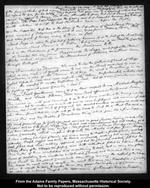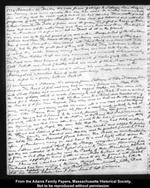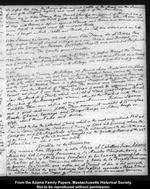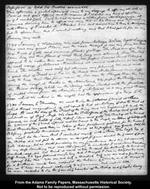Page 1
Peace December 28. 1779
of the famous Duke of that name, but probably grown more Philosophical at least less catholick than his Ancestor, has refused to pay for his Estate. This Refusal has given rise to a Lawsuit, which has been carried by appeal to Rome. The Duke attempted to prove that Saint James was never in Spain. The Pope has suspended the Cause, and it is suspected because His Holiness doubts whether it is safe to trust the Dukes Evidence before the Public.
Upon the Supposition that this is the place of the Sepulture of Saint James, there are great numbers of Pilgrims, who visit it, every Year, from France, Spain, Italy and other parts of Europe, many of them on foot.
Saint Iago is called the Capital of Gallicia, because it is the Seat of the Archbishop and because Saint James is its Patron: but Corunna is in Fact the Capital as it is the Residence of the Governor, the Audiencia &c. &c.
We travelled this day from Baamonde to Lugo, and passed the River Minho which originates in the Mountains of Asturia, and flows down through Portugal.
1779 December 30 Thursday.
We went to see the Cathedral Church at Lugo which is very rich. -- A Youth came to me in the Street, and said he was a Bostonian, a Son of Mr. Thomas Hickling. He went a Privateering in an English Vessell, he said, and was unfortunately taken. Unfortunately inlisted, said I. . . . He wanted to make his fortune he said. Out of your Countrymen and by fighting against your Country? said I.
Two Irish Gentlemen came to pay their respects to me, Michael Meagher Oreilly, and Louis O Brien. These were Irish Officers in the Spanish Service. They invited me with great Earnestness to go to their house and spend the Evening and sup with them: but the Weather was now so cold and we were so fatigued with our uncomfortable journey that I could not think of going out. We excused ourselves as well as We could, and when Obrien found that We could not go to his house, he sent Us a Meat Pie and a minced Pie and two Bottles of Frontinac Wine, which gave Us a fine Supper.
We went from Lugo to Galliego and arrived in good Season, having made six Leagues and an half from Lugo. The Road was mountainous but not rocky as it had been almost all the Way heretofore. We passed over a large Bridge over a River called Carasedo, which empties itself into the Minho not far from Lugo. I saw nothing but Signs of Poverty and misery among the People: a fertile Country not half cultivated: People ragged and dirty: the Houses universally nothing but mire, Smoke, Soot, fleas and Lice: nothing appeared rich but the Churches, nobody fat but the Clergy. Many of the Villages We passed, were built with Mud filled in between joists, Nine tenths of them uninhabited and mouldering to dust. Yet in every one of these Scenes of desolation, you would see a splendid Church, and here and there a rosy faced Priest in his proud Canonicals rambling among the rubbish of the Village. The Roads the worst, without exception the worst that were ever travelled, in a Country where it would be easy to make them very good: No Simptoms of Commerce, or even of internal Trafick: No Appearance of Manufactures or Industry.
Page 2
1779 December 31. Fryday.
We rode from Galliego to Sebrero, seven Leagues. Our journey was more agreable this day, than usual: the Weather was remarkably fair and dry, and the roads not so bad as We had expected. There was the grandest profusion of wild irregular Mountains I ever saw: yet laboured and cultivated to their Summits. The Fields of Grain were all green. We passed a Range of Mountains that were white with Snow, and there were here and there Banks of Snow on the Mountain We passed over: but no Frost at all in the Ground.
We were now on the highest ground of all, and within Musquet Shot of the Line between Gallicia and Leon. The Houses all along our journey were small and of Stone, except those of mud. Some of them were covered with Tiles of Brick, and some with Tiles [of] Slate, but by far the greater part of them, with Thatch. They interweave a Shrub of which they make brooms, among the Straw, and bind both together with Wyths. These thatched Roofs are very numerous, but universally dirty and smoaky. The People wore broad brimmed hats, or Caps made of Woolen Cloth, like their Coats, Jacketts and small Cloaths, which are made of black Sheeps Wool, without dyeing, and consequently are all of a colour. We were shewn some of the Marragatoes, a peculiar kind of wild wandering People, who were particularly dressed in a greasy leathern Jackett.
1780. January 1. Saturday.
We arrived, from Sebrero, at Villa Franca, seven Leagues. The Road at first was very bad, in many places very steep, Hills with sharp Pitches, and encumbered with ragged rocks. We then came into the Road of Leon, which is made seemingly out of a Rock. It was an excellent road for a League and an half. We then came to a River, and travelled along the Banks of it for some Leagues. This Way was as bad as the other was good; miry, rocky, up and down, untill We came into a new road, about two Legues from Villa Franca. Here again We found a road made entirely by Art, at a great Expence, but it seemed to be made, forever. They are were going on with this Work, which is an honor to the Nation, as it shews that Improvements are beginning, and that some Attention is paid to the Ease, Convenience, Utility and Commerce of the People. We were told that the King had lately employed the Officers and Soldiers of his Army upon these Works and intended to pursue them. The Country We travelled over this day was the greatest Curiosity I had ever beheld. The River Barcarel a flows between two Rows, an uninterrupted succession of Mountains, rising on each hand to a vast hight, which appear the more sublime and awfull Objects, for the strange irregular Shapes of them. Yet they are cultivated up to their highest Summits. There were flourishing fields of Grain, on such steep declivities, near the Peaks of these Mountains, that I could not conceive it possible for Horses, Cattle or even Mules to stand upon them to plough them. I know not indeed how Men could stand to dig the Ground with Spades. The Houses had been uniformly the same, through the whole Country hitherto. Common habitations for Men and Beasts. The same smoaky, filthy Dens. Not one decent house had I seen, since I left Corunna.
Page 3
We passed this day, the Ruins of an ancient Castle of the Moors, on the Summit of one of the steepest, highest, and most rugged of the Mountains.
There are in Villa Franca, three Parish Churches, one Convent of Men and one of Women. There is an old Brick Castle built in Feudal Times when Baron was at War with Baron; a defence against Lances, and Bows and Arrows and no more. Possibly it might ward off musquet Balls.
Here I bought a Mule, Saddle and Bridle for sixty two dollars and an half.
1780. January 2. Sunday.
We rode from Villa Franca, da el Bierzo Rio Pte, passed through several Villages, and over Rivers and Bridges; We passed also Campo de Narraya, Cacabelos Rio P. and arrived at Ponferrada where We dined. The Country grew smoother.
1780. January 3. Monday.
We rode to Astorga. We passed through the Town and Country of the Marragattoes. The Town is small and stands on a brook in a great Plain. As We went into Astorga, We met Coaches and genteel People.
1780. January 4. Tuesday.
At Astorga, We found clean Beds and no fleas for the first time since We had been in Spain. Walked twice round the Walls of the City, which are very ancient. We saw the Road to Leon and Bayonne and the road to Madrid. There is a pleasant Prospect of the Country from the Walls. Saw the Market of Vegetables. The Onions and Turnips were the largest and finest I ever saw. The Cabbages, Carrots &c. appeared very good. Saw the Markett of Fuel, which consisted of Wood, Coal, Turf and Brush. Numbers of the Marragatto Women attended the Market with their Vendibles. These were as fine as any of our American Indian Squaws and a great deal more filthy. Their Ornaments consisted of Crucifixes, Beads, Chains, Earrings and Finger Rings, in Silver, brass or glass, about their Necks and Arms.
We went to see the Cathedral Church which is the most magnificent I had yet seen in Spain. Saw the Parliament House, or Casa del Cieudad, where the Corregidor and City Magistrates assemble, to deliberate, and to execute the orders of the King. Some of the Spaniards brought me the Gazette of Madrid of the 24th of December, in which was this Article.
Coru a 15 de Diciembre
Hoy mismo ban llegado a esta Plaza el Cabellero
Juan Adams Miembro del Congreso Americano, y su Ministro Plenipotentiario, la Corte de Paris, y
Mr. Deane [i.e. Dana] Secretario de Embaxada quienes salieron de Boston el 15 de Noviembre Ultimo bordo de la Fregata Francesa de Guerra la Sensible que entro en el Ferrol el dia 8 del corriente. Trahe la Noticia de que habiendo los Ingleses evacuado a Rhode Island y retirado todas sus Tropes a Nueva York. Los Americanos tomaron
Page 4
Possession de todos los Puestos evacuados.
This Afternoon a genteel Spaniard came to my Lodgings to offer me, all Sorts of Services and good Offices, and to enquire if I wanted any kind of Assistance or if I wanted Cash. Said he had received a Letter from Mr. Lagoanere at Corunna desiring him to afford me every Aid in his Power, and to furnish me with Money if I wanted it. I thanked him and desired him to thank Mr. Lagoanere, but to assure him that I wanted nothing and that I had got so far on my journey very well.
1780 January 5. Wednesday.
We rode from Astorga to Leon, Eight Leagues. This was one great Plain, and the road through it was very fine. We saw large Herds of Cattle and immense flocks of Sheep. The Sheep were of an handsome Size, and their fleeces of Wool thick, long and extreamly fine. The Soil appeared to be rather thin and barren. We passed several small Villages, the vast range of Asturias Mountains all covered with Snow on our left hand. The Weather was cold, but otherwise very pleasant. We met with a good deal of Frost and Ice in the Road. Our Mules found more difficulty to keep their Steps firm upon the Ice over the Sloughs than they had among the roughest Rocks in the Mountains. We passed the Bridge over the River Orbigo, which in the Spring when swelled with the freshetts of melted Snow from the Mountains of Asturias, is a very great River. Leon, which We entered in the night, had the Appearance of a large City.
1780 January 6. Thursday.
We went to see the Cathedral Church at Leon which though magnificent, is not equal to that at Astorga, if it is to that at Lugo. It was the day of the Feast of the King and We happened to be at the celebration of High Mass. We saw the Procession of the Bishop and of all the Canons, in rich habits of Silk, Velvet, Silver and gold. The Bishop as he turned the Corners of the Church spred out his hand to the People, in token of his Apostolical Benediction; and those, in token of their profound gratitude for the heavenly Blessing prostrated themselves on their Knees as he passed. Our Guide told Us We must do the same. But I contented myself with a Bow. The Eagle Eye of the Bishop did not fail to observe an Upright figure amidst the Crowd of prostrate Adorers: but no doubt perceiving in my Countenance and Air, but especially in my dress something that was not Spanish, he concluded I was some travelling Heretick and did not think it worth while to exert his Authority to bend my stiff Knees. His Eyes followed me so long that I thought I saw in his Countenance a reproof like this "You are not only a Heretick but you are not a Gentleman, for a Gentleman would have respected the Religion of the Country and its Usages so far as to have conformed externally to a Ceremony that cost so little."
We were conducted to see the Council Chamber of the Bishop and Chapter, hung




